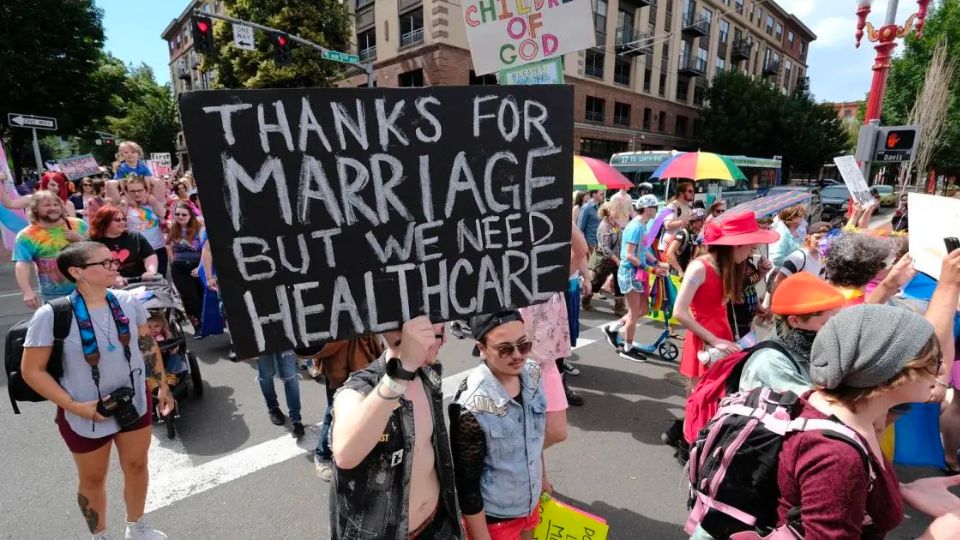Uganda had a great fight against HIV for many years. From 1990 to 2019, the country’s death rate dropped by almost 90%. Now, the Anti-Homosexuality Act, a broad law passed last year, could make the epidemic worse because LGBT people are being refused or are too afraid to get the medical care they need.
Consensual sex between people of the same gender is against the law. It also says that everyone must report anyone they think is doing something illegal, including health care workers who are taking care of patients.
People who live with HIV and have relationships with other people of the same gender can be charged with “aggravated homosexuality,” which is a crime that can lead to death.
Two to twenty years in jail are possible for anyone who “knowingly promotes homosexuality” by hiring or housing an LGBT person or not telling the cops about one. Lawyers and activists who were interviewed say that a lot of Ugandans have been fired from their jobs and kicked out of their homes.
A lot of people have been interviewed and said that entrapment and blackmail are common in real life, on social media, and on dating apps. Sometimes the cops are involved. There have been threats and acts of violence against LGBT people and the supporters and health care workers who help them.
The law has been criticized all over the world and has hurt Uganda’s economy a lot. But a lot of people in that country like it. A lot of people in Uganda think that homosexuality comes from the West and that the law is there to stop it. The Constitutional Court of the country will decide next week if the act is legal or not.
Also Read: Clare Man Accused of Threatening Amish Family During a Buggy Ride
In June, the Ugandan health ministry promised health care to everyone, no matter their identity or orientation, in reaction to pressure from global health organizations. It didn’t say that people wouldn’t be charged with anything. Several times, the country’s health ministry was asked to speak on how the act would affect public health, but they did not.
The health minister, Dr. Jane Aceng, said on the social networking site X that the government will make sure people can get to HIV/AIDS prevention programs and “remains committed to ending AIDS as a public health challenge.” Some people see a disaster coming. The rule is meant to help LGBT people, but the discrimination and shame that comes from it could stop all Ugandans from getting medical care, said William W. Popp, the US ambassador to Uganda.
“The United States government thinks the whole law should be thrown out,” he said in an interview. “It goes against basic human rights and puts everyone in Uganda in danger.”
Dozens of LGBT people, supporters, and health care workers in Uganda who were interviewed said they were afraid that the law would have a terrible effect on public health. Clinics and hospitals say that the number of people going in for HIV testing, prevention, or treatment has dropped by at least half, but it’s hard to find hard numbers.
Some homes for HIV+ people have closed, and centers that used to let people with HIV get help whenever they wanted now only see clients during certain hours, and often only by appointment, to lower the risk of raids. Dozens of people who work in health care and in patients have been caught.
“The government has worked hard to make it seem like the Anti-Homosexuality Act isn’t being enforced and isn’t a real threat to LGBT people, but that’s not true,” said Justine Balya, director of the Human Rights Awareness and Promotion Forum, which helps many of the people who were arrested.
Also Read: Center Line Man Sentenced to 40 Years for Sexual Exploitation of Children
Uganda had been ahead of the curve when it came to HIV studies and public health policy. The new law says that scientists have to share the names of people who took part in studies.
Ambassador Popp said, “It’s troubling from a research and academic point of view, as well as a scientific point of view, to actually develop the medicines and tools we need to deal with disease epidemics in the future.” Controlling HIV is closely linked to protecting gay rights around the world.
A new U.N. report says that gay and bisexual men who live in countries that make homosexuality illegal are 12 times more likely to have HIV than men who live in other parts of the world. Nathalie Issa Rwaguma, 34, a gay activist, said, “We are in so much pain, and our lives are in danger.”



Leave a Reply